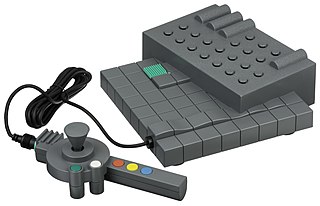The Muppets is a shared universe and ensemble cast of puppet characters known for an absurdist, burlesque, and self-referential style of variety-sketch comedy. Created by Jim Henson in 1955, they are the namesakes of the Disney-owned media franchise that encompasses television, film, music, and other media associated with the characters.

Sesame Street is an American educational children's television series that combines live action, sketch comedy, animation and puppetry. It is produced by Sesame Workshop and was created by Joan Ganz Cooney and Lloyd Morrisett. The program is known for its images communicated through the use of Jim Henson's Muppets, and includes short films, with humor and cultural references. The series premiered on November 10, 1969, to positive reviews, some controversy, and high viewership; it has aired on the U.S.'s national public television provider PBS since its debut, with its first run moving to premium channel HBO on January 16, 2016, then its sister streaming service HBO Max in 2020.

A fictional universe, or fictional world, is a self-consistent setting with events, and often other elements, that differ from the real world. It may also be called an imagined, constructed, or fictional realm. Fictional universes may appear in novels, comics, films, television shows, video games, and other creative works.
Batman is a fictional superhero appearing in comic books published by DC Comics.

Sonic the Comic was a British children's comic published by Fleetway Editions between 1993 and 2002. It was the UK's Sega comic, featuring stories about its mascot Sonic the Hedgehog and related characters, as well as comic strips based on other Sega video games, along with news, reviews, and tips for games released for Sega systems.

Play with Me Sesame is an American children's television series, created by Sesame Workshop and Nickelodeon for their former joint venture Noggin. It is a spin-off of Sesame Street hosted by Bert, Ernie, Grover, and Prairie Dawn. The series' backgrounds and animated elements were made by Nickelodeon Digital in New York City. Nickelodeon and Sesame developed the show to expand on Sesame Street by directly encouraging young viewers to interact with the characters. To do this, they combined classic Sesame Street footage with new segments, where the hosts invite preschoolers to join them in games.
Cliffhanger is a plot device as an ending of a fictional work.
Kid Paddle is a Belgian gag-a-day comic series created by Michel Ledent (Midam) in 1993. It was first published in the Franco-Belgian comics magazine Spirou until branching out into its own volumed comic albums in 1996.
Fatty is a derogatory term for someone who is obese. It may refer also to:
Abby or Abbie is generally a nickname for the feminine given name Abigail, but can also be a given name in its own right. It may refer to:

View-Master Interactive Vision is an interactive movie VHS console game system, introduced in 1988 and released in the USA in 1989 by View-Master Ideal Group, Inc. The tagline is "the Two-Way Television System that makes you a part of the show!" The titles include four Sesame Street games, two games featuring the Muppet Show characters, and a Disney game, Disney's Cartoon Arcade.
Sesame Street is a nationally syndicated comic strip inspired by Sesame Street. Written and drawn by veteran Sesame animator Cliff Roberts, the earliest concept art was created in 1970, and by 1971, a promotional booklet was created as the comic entered the market, courtesy of King Features. The strip debuted on November 15, 1971, in more than 175 newspapers, and ran until 1975. The strip, which ran both daily and on Sundays, was conceptually similar to the series in its pedagogical goals, but, in the first year of the strip, conspicuous by the absence of the Muppets.
This page is based on this
Wikipedia article Text is available under the
CC BY-SA 4.0 license; additional terms may apply.
Images, videos and audio are available under their respective licenses.




